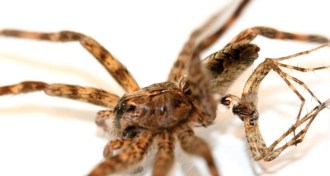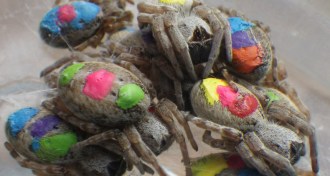Search Results for: Spiders
Skip to resultsCan’t find what you’re looking for? Visit our FAQ page.
1,176 results for: Spiders
-
 Chemistry
ChemistrySecret of strong silk
By controlling the amount of water in their glands, spiders and silkworms prevent their silk proteins from crystallizing prematurely.
-
 Animals
AnimalsFirst Impressions: Early view biases spider’s mate choice
In a new wrinkle on how females develop their tastes in males, a test has found that young female wolf spiders that see a male's courtship display grow up with a preference for that look in mates.
By Susan Milius -
 Animals
AnimalsNot-So-Great Hunter: Said the spider to the fly—Eek! I’m outta here
The poisonous brown recluse spider may turn out not to be a fearsome hunter so much as a scavenger.
By Susan Milius -
 Animals
AnimalsIn dark fishing spiders, males’ postmating nap is permanent
Species prepares for two pairings but goes into a fatal coma after a single encounter.
By Susan Milius -
 Animals
AnimalsSpider’s personality matters when job hunting
Boldest individuals of social species tasked with seeking out prey.
By Meghan Rosen -
 Humans
HumansBabies perk up to sounds of ancient hazards
Evolution has primed infants to focus on noises linked to longstanding dangers, a new study finds.
By Bruce Bower -
 Humans
HumansFrom the December 20, 1930, issue
alt=”Click to view larger image”> ARACHNE PROVIDES LOVELIER FESTOONS FOR CHRISTMAS TREE Christmas trees, with their exotic and ephemeral flowing of tinsel and bright paper, are apt to arouse in moralizing adults sentiments of vague regret that all this splendor is for a few hours only. Children, fortunately, are spared such thoughts: For them the […]
By Science News -

From the October 17, 1931, issue
MATERNAL CARES MULTIPLY WITH COMING OF COLD Winter has breathed a hint of its coming already, in puffs of frosty air that make us forget the heat of summer that is gone, even of the unseasonable hot spell of early September. But the coming of the cold bodes only ill for the cold-blooded creatures of […]
By Science News -

From the April 9, 1932 issue
SPIDERS’ EGGS FORM PATTERN LIKE MOSAIC OF PEBBLES Like a rough mosaic of pebbles is the array of spider’s eggs photographed by Cornelia Clarke and reproduced on the cover of this week’s Science News Letter. Although smaller than small pinheads, the enlarging lens brought the eggs up to such apparent size that they were guessed […]
By Science News -
 Humans
HumansLetters from the February 16, 2008, issue of Science News
Inert placebo? Regarding “Getting the Red Out” (SN: 1/19/08, p. 35): While drug companies wish to market their products, my attention is drawn to the fact that 1 in 8 of the control group of psoriasis patients was cured by placebo effect. Who will investigate the process therein? Is there a market for it? Carson […]
By Science News -
 Humans
HumansLetters from the June 3, 2006, issue of Science News
Latitude adjustments “Shafts of snow sculpted by sun” (SN: 4/1/06, p. 206) doesn’t say that penitentes appear only in the Andes, nor does it say in what part of the Andes they appear. Does the formation of penitentes require that the sun be nearly directly overhead for part of the day? Can penitentes form only […]
By Science News -
 Humans
HumansLetters from the October 28, 2006, issue of Science News
Slow down a minute “Braking news: Disks slow down stars” (SN: 8/12/06, p. 109) says that a magnetic linkage between spinning stars and the charged particles in the dusty disks that surround them slowed the spin of the stars, but says nothing about its effect on the disk. The law of conservation of angular momentum […]
By Science News